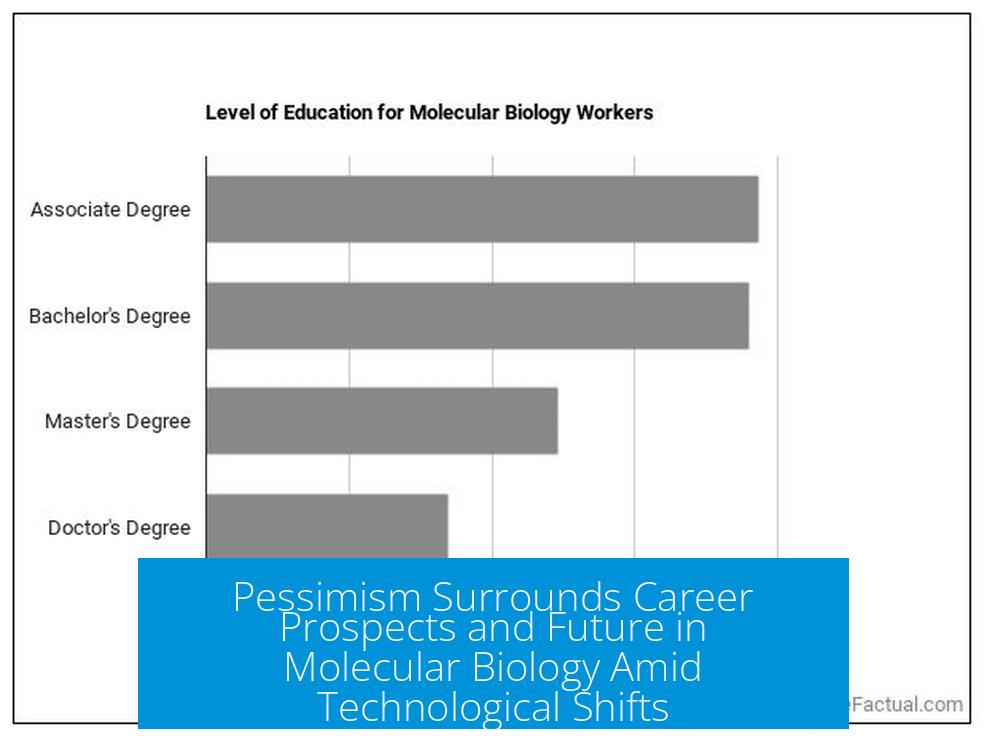Pessimism about a Career in, and the Future of, Molecular Biology
The future of molecular biology faces concerns about bench work being replaced by technology, the increasing need for computational skills, and integrating bioinformatics with traditional lab methods. While some express doubts about the sustainability of hands-on experiments alone, many emphasize the ongoing importance of bench work combined with computational techniques. Others remain optimistic that collaboration and balanced skill sets will shape the field’s trajectory.
Technological Changes and Bench Work Concerns
Molecular biology traditionally relies on hands-on experimental bench work. Several voices express concern that advancing technologies in modeling and bioinformatics may threaten the future necessity of such direct laboratory experiments. A common worry is that automation and computational methods will rapidly supplant manual processes. For example, one student, eager to engage in lab research, feels discouraged knowing that computers can perform many tasks faster.
Despite these concerns, some experts firmly believe that solid bench work remains indispensable. Experimental data generation often requires human insight and hands-on skills that cannot be fully duplicated by machines or software. This perspective holds that no matter how advanced computational tools get, they cannot wholly replace the experimental processes essential for validating biological hypotheses.
Integrating Bioinformatics with Bench Work
Bioinformatics plays a vital role in interpreting complex data and enhancing molecular biology research. It is viewed as a useful tool that complements—not replaces—bench work. The future likely involves a hybrid approach where computational analysts and experimentalists collaborate closely.
- Bioinformatics helps maximize data obtained from experiments.
- Complete reliance on computational approaches risks losing essential hands-on insights.
- Effective research teams blend strong bench work skills with bioinformatics expertise.
- Data analysis demands significant time and specialization; hence, roles may divide accordingly.
Staying relevant in academia requires an understanding of bioinformatics, either personally or through collaboration. Lab leaders often recognize the need for team members proficient in computation to handle data-heavy tasks, allowing experimental scientists to focus on generating datasets.
The Growing Burden of Computational Skills
Molecular biology increasingly demands computational literacy due to the scale and complexity of experiments. Tasks such as single-cell multiomic analysis, a cutting-edge approach mixing genomics and transcriptomics, require coding skills for data interpretation.
Many researchers transition from traditional techniques like RNA analysis and CRISPR to advanced data-driven experiments. Several factors drive the need for computational knowledge:
- Large experimental datasets require management and analysis.
- Programming (e.g., Python) helps streamline data handling and repetitive tasks.
- High-throughput techniques generate more data than manual processing can address.
Training programs, including coding boot camps in biotech hubs like the Bay Area, reflect this trend. Even basic programming skills can improve efficiency and foster better experimental design. Some suggest that tackling tedious data management with coding can reduce workload and increase productivity.
Encouraging a Balanced Approach
Molecular biologists are encouraged to embrace computational tools without abandoning traditional bench skills. This dual competency can accelerate research and reduce costs while maintaining rigor.
In the biotechnology industry, teams often include both bench scientists and bioinformaticians. Effective communication between these groups is critical for project success. Professionals versed in both areas can facilitate collaboration and innovation within teams.
This balanced skill set positions molecular biologists well for careers in both academia and industry.
Counterpoints to Coding Necessity Pessimism
Despite the computational demands, some experts dispute the view that coding is mandatory for all molecular biologists. They argue that collaboration remains the key:
- Researchers without programming skills can partner with computational experts.
- In many labs and companies, coding specialists handle data analysis.
- Proficiency in Excel and statistics is often sufficient for many roles.
- Creative skills like using illustration software aid scientific communication.
The research process depends on both computational modeling and experimental validation. Computational outputs must be tested through molecular biology techniques. This interplay ensures that the underlying science remains grounded in empirical evidence.
Summary of Key Points
- Bench work remains essential but faces pressure from technological advancements.
- Integration of bioinformatics and experimental methods is crucial for future success.
- Computational skills are becoming more important, especially for data analysis and experiment design.
- Embracing coding can boost efficiency but is not mandatory for all molecular biologists due to team collaboration.
- A balanced combination of hands-on and computational expertise likely defines the molecular biology career of the future.





Leave a Comment